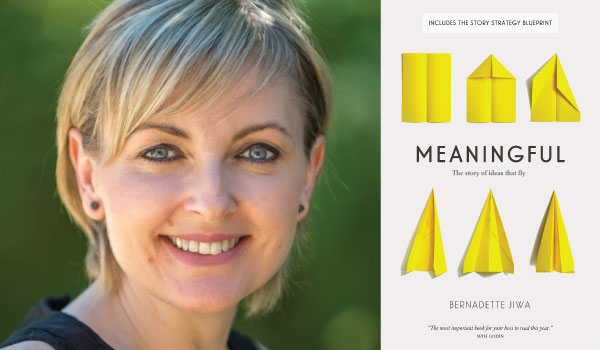 For every startup that succeeds, many more fail. But what is it that makes the difference between a successful company, and one that just doesn’t quite hit the mark?
For every startup that succeeds, many more fail. But what is it that makes the difference between a successful company, and one that just doesn’t quite hit the mark?
Bernadette Jiwa uncovers that and more in her new book, Meaningful: The Story of Ideas That Fly. According to Jiwa, many companies miss an essential opportunity to focus on the customer story and what they want, and instead focus on the story that they want to tell.
The mix of customers and innovation is a key focus for the book and how those two concepts can be used to change the life of the people that use your products or services.
One of the great things about this book is that it isn’t just filled with theories of how these concepts should work in the real world. Instead, the author uses stories and examples of real companies, many of which have become beloved brands, because of their approach to innovation and focus on customers. Additionally, you’ll find a blueprint for understanding the connection between customers and your products or services.
One of my favorite passages in the book is seemingly simple, but something that brands often overlook in an effort to get their company off the ground: “The best products and services in the world don’t simply invite people to say ‘this is awesome’; they remind people how great they themselves are.”
Building brand awareness is another goal that has long been on the minds of many marketers. However, the approach that we used to take, and the requirements for meeting customer needs today have changed. Below are the old and new rules of brand awareness according to Bernadette.
Old Rules of Brand Awareness:
- Make something for everyone
- Tell our story
- Attract customers
- Build brand awareness
New Rules of Brand Awareness:
- Understand the customer’s story
- Make something they want
- Give them a story to tell
- Create brand affinity
Putting What We Learned Into Action
Below are a couple examples of how the information in this book has reinforced TopRank Marketing’s customer centric approach to digital marketing.
Debbie Friez, Social Media Lead, TopRank Marketing
Bernadette Jiwa uses storytelling to inspire marketers to find a new way to provide meaning for their audience. I was able to utilize her insights for a recent client meeting. I wanted the client to understand we are no longer looking to drive awareness and attention of the brand. The new marketing model looks for audience attraction and affinity. We can’t just think about what the brand wants, but what the customer sees as useful and valuable to their lives.
Josh Nite, Content Marketing Lead, TopRank Marketing
I found the way Bernadette talks about “seeing customers” to be inspiring. When I’m writing content for a client, it reminds me to write with their customers in mind. Does what I’m saying have value? Does it help them be their best selves?
Interview With Author Bernadette Jiwa
I was so pleased when I was able to connect with Bernadette and she agreed to answer some interview from our book club members. And, she did not disappoint. Below are her answers to some of your most burning questions about Meaningful: The Story of Ideas That Fly.
Q: What inspired you to write this book?
A: My readers and my clients. I’ve been doing this work for a number of years and what is interesting is that every time I write a book I realize that I needed to write the book before that book to fill in some gaps for the readers. What I’m helping people to do is unlock the magic and the value in their story, but the key to doing that is understanding the customer story first.
People wanted to know, how do I get more hits, traffic and customers. What I recognized in working with other companies is that people were starting in the wrong place. It all started with my customer which I believe walks the talk of the book.
Q: One of the concepts that stood out to me the most was when you said “there is a life and a way of being before the product or service existed, and a life and way of being after it.”. What do you think brands can do to not only provide a product/service, but change the way that life exists after?
A: Because we have ideas that we want to get out in the marketplace, we tend to focus on the short-term. If you think about any of the brands you love and think about your life before you used that app or product and your life after, you’ll see the difference it made.
A long-term view focuses on where you want to take your customer and what happens in their life because your product exists. A great example of that is Uber. Think back to what was it like waiting for a cab and not knowing if the cab was going to arrive? Uber thought about all of the ways they can solve problems for the customer and build it into their product.
Your product has the potential to be something that creates value and magic in a customer’s life and changes how they feel, and what they do and how they go about their day.
Q: What methods do you recommend for listening to current or potential customers? What channels would you use for gathering that intel?
A: There are so many ways that we can listen and we don’t take advantage of enough of them. If you think about social media, we have access to resources that only massive multi-billion companies had access to previously. Now, you can jump on social media and start listening. Instead of using it to broadcast which is what we mostly use it for, you can start listening to your customers today.
You can find people in your demographic or whose worldview you want to appeal to and start listening to them on social media, public transport, the places they hang out.
Sometimes we get so stuck on developing what we are developing and we look internally and we don’t actually reflect out to the world and the opportunities to do that.
Q: In your book, you describe how entrepreneurs get stuck focusing on the bottom of the ‘Expectation Hierarchy’ pyramid (product, service, platform, access). In an increasingly results-oriented marketplace, how can we break the cycle, and focus business efforts on empathy, while still producing results? Is it even possible?
A: If you just measure business success on the amount of traffic you get or customers on your website, then you stop focusing on the difference you’re creating for those customers.
We need to look at the quality of those numbers. How are you measuring connection with your customer and loyalty? That is the most important thing. I would say what is more important than lots of shallow connections is fewer, deeper connections. A lot of times I try to flip my client’s mindset to how they will deepen connections versus how they will get the most customers to their door.
If you can actually deepen those connections that is how you garner more loyalty and repeat business and create products for them instead of trying to find more customers for the products you have.
Q: What are the top ideas that you want readers to walk away from your book understanding?
- First, focus on the customer. That is the key message in the book.
- Sit down and use the tool in the book. A lot of times we read a book and don’t do anything with it.
- Think about intangible benefits that you provide. There are both rational and emotional benefits that you can provide to your customers.
- Think about the change that you are going to create in your customer with their product.
- Don’t be afraid if you don’t have all of the answers right away, just start.
What Did You Learn?
To me, this book was both inspirational, and actionable. There is much to be learned from companies that have succeeded and failed in meeting customer needs. I’m very curious to know what passages of the book stood out to you and which ones have you already started applying to your marketing?
If you aren’t already a member of the TopRank Marketing Book Club, join now!


